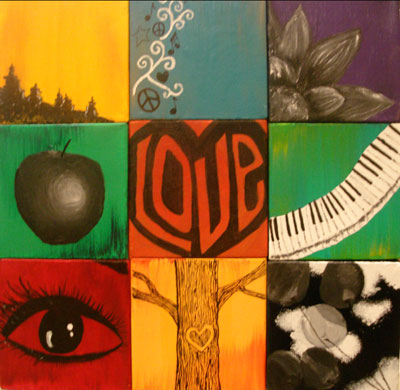All Nonfiction
- Bullying
- Books
- Academic
- Author Interviews
- Celebrity interviews
- College Articles
- College Essays
- Educator of the Year
- Heroes
- Interviews
- Memoir
- Personal Experience
- Sports
- Travel & Culture
All Opinions
- Bullying
- Current Events / Politics
- Discrimination
- Drugs / Alcohol / Smoking
- Entertainment / Celebrities
- Environment
- Love / Relationships
- Movies / Music / TV
- Pop Culture / Trends
- School / College
- Social Issues / Civics
- Spirituality / Religion
- Sports / Hobbies
All Hot Topics
- Bullying
- Community Service
- Environment
- Health
- Letters to the Editor
- Pride & Prejudice
- What Matters
- Back
Summer Guide
- Program Links
- Program Reviews
- Back
College Guide
- College Links
- College Reviews
- College Essays
- College Articles
- Back
Modern Art: Is Anything Authentic?
It’s quite the elegant art gallery—the kind of place you go to be surrounded by men who own more ties than socks and women who wear pencil skirts everywhere. They’re all admiring this one painting so, naturally, you too pretend to be taken aback by its texture or vibrant colors or whatever it is that they’re going on about. Really, you’re thinking: hey, who framed my checkered top—the one I spilled wine all over and Sparky sneezed on the other day? Man, if I could sell that for this much money.
We’ve all been there. The truth is that too many of us reason that if an artwork is priced with a phone-number, then it must have some artistic value, right? Well, no, not really.
As we all know—and probably learned through the embarrassment of gauche remarks like “My toddler could do that!”— the arts are highly subjective; the criteria to evaluate it are basically tossed to the critic to do with it what they will. However, one pivotal criterion that we tend to overlook is that of authenticity.
Many believe that, while art was once any skilled handicraft, to be an artist today entails, above all, a degree of authenticity. According to the author Lionel Trilling, “a work of art is itself authentic by reason of its entire self-definition; it is understood to exist wholly by the laws of its own being”. So, if an artist chooses to tweak their work here and there, thinking that it might up its price, it ceases to be authentic, therefore sacrificing its artistic value for monetary value.
But, hey, we’ve all done things we aren’t proud of for a few dollar bills.
The issue is, of course, that we also tend to unknowingly toss away more than a little cash for commercialized art that is, in essence, inauthentic. Consequently, it may not even fit into some’s definition of art.
In that case, you, my friend, have been ripped off.
Take, for instance, Thierry Guetta’s art; although there is ensuing speculation about the events that led up to it, there’s no denying that Guetta, an amateur filmmaker under the pseudonym “Mr. Brainwash”, held, with the help of street-artist Banksy himself, an art gallery that made him a million dollars. The rise of Mr. Brainwash into the modern art world is depicted in Banksy’s “Exit Through the Gift Shop” documentary, where Banksy emphasizes that, despite Guetta’s dilettantism and utter lack of artistic talent whatsoever, he manages to ‘sell’ him to the art world. In one of the documentary’s interviews, Banksy concludes with “I don’t what it means, Thierry huge success and arrival in the art world… Maybe art is all a big joke”.
A little disheartening to hear from the artist that was named one of the 100 most influential people in 2010, huh?
But maybe what commercialization has turned art into is a joke; Banksy’s documentary, after all, is a commentary on how the commercialization of art has distorted our ability to assess art for ourselves, making us immensely gullible to sell-outs.
Unfortunately, we allow an elitist group of art critics to tell us what to appreciate, even though the appeal of art had once been its subjectivity. And yet the stories of sell-outs like Guetta force us to challenge whether all artistic interpretation is correct. We could indeed give all artists participation medals. But would that be the right approach?
For instance, think of somebody who decides to put together some abstract, you-decide-for-yourself artwork because, well, it’s an excruciatingly long train ride. Now think of another somebody, with over 30 years of artistic experience, whose piece was inspired by the death of a friend, or, say, anything else that’s more emotive than a train-ride.
With just this information, the two artworks cannot be said to have the same value; in the same way an artist like Guetta can lack authenticity, they can lack a meaningful artistic biography, which refers to not only their level of artistic experience but to what motivated them in the first place.
So what? Banksy makes it pretty clear that we don’t care about art’s true value anyway.
The problem is that we’ve wrongfully allowed for commercialization to steer attention away from authenticity and artistic biography. We’ve let ‘branding’ seep into the art-world. We trail after a big name like we follow the smell of a burger joint.
But worst of all, we throw money at artists like Mr. Brainwash, even if, as street-artist Shepard Fairy said in an interview, Guetta’s art was just throwing a bunch of stuff against the wall to “see what sticks”.
Sadly, we’ve let art become just like any other commodity. As Banksy emphasizes, we’ve forgotten that art ought to be experienced, rather than consumed.

Similar Articles
JOIN THE DISCUSSION
This article has 0 comments.
